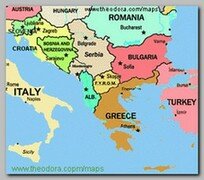– THE BALKAN
 The Balkan, which means in Turkish “a chain of wooded mountains”, is the area between the Aegean Sea in the East, the Mediterranean Sea in the South, the Adriatic Sea in the West and the Christian Catholic countries of Austria, Hungary and Romania in the North.The region stretches on 550,000 km and has a population of about 60 millions (02/2008) – about the size of France in territory and population.
The Balkan, which means in Turkish “a chain of wooded mountains”, is the area between the Aegean Sea in the East, the Mediterranean Sea in the South, the Adriatic Sea in the West and the Christian Catholic countries of Austria, Hungary and Romania in the North.The region stretches on 550,000 km and has a population of about 60 millions (02/2008) – about the size of France in territory and population.
The Balkan was the front line of the historical theological controversy between the Western Roman Catholic church and the Eastern Greek Orthodox from the 4th century.
Generally speaking the Balkan was under Muslim Turkish Othman Empire during about 500 years from the 14th century to the 19th century when the Turkish Othman Empire began to disintegrate and created a political vacuum in the Balkan.
During the Turkish reign the Balkan became the main front line between Islam and Christianity. Christian nations such as the Bosnian and Albanians converted, in large numbers, to Islam and became the spire head of the Othman Empire in the Balkan while other stuck with Christianity and refer to themselves as the standard bearer of Christianity.
The reshaping of the Balkans, after the Turkish retreat, placed the Balkan, once again, in the front line of power struggle between Russia, who was expanding West and South, Britain determined to prevent the RUSSIAN expansion to the Mediterranean Sea and the German speaking countries – Austro-Hungaria and Germany – from permeating to Central Europe. Each power had its allies which they supported and armed against the allies of the contestant. Russia supported the Bulgarians and the Serbians, UK the Greeks and Catholic Austria the Catholic Croats. Indeed, at the end of the 19th century and the pre World War I period, the “Question of the Balkan” was the axis of European diplomacy just as the Middle East is in the post World War II.
After World War II the population that supported the Germans – The Croats and Bosnians came under the rule of the Pro- RUSSIAN anti German Serbian former partisans commanded by Tito ( he himself was a Croat). When Tito died in 1980 and the Patron of united Yugoslavia – The Soviet Union collapsed in 1991, the artificial Yugoslavia disintegrated to its basic historical ethnic and religious guidelines. The repartition of Yugoslavia led to a disastrous civil war, ethnic cleansings, mass executions and atrocities. Once again the powerful Western European countries supported their historical allies against the RUSSIANs – the Croats and Bosnians. Russia, weak for the time being, supported its traditional ally – the Serbs. Eventually the Western powers, through NATO took, advantage of the weakness of Russia and imposed, in 1996 and Dayton agreement, a new political order in the Balkan.
Yugoslavia disintegrated to 7 independents states (02/2008). Some of them, such as the newly born Kosova, are only partially governed. Russia, that is recovering and regaining its military and political power is, again, intervening in the Balkan and the region became, again, a front line between RUSSIAN and Western influence and a source of constant tension for Europe.
Although in the Civil War in former Yugoslavia in the years 1994-96 all sides committed atrocities Bosnia suffered the most. It is the only place on earth in the last 50 years that Muslims were systematically butchered, deported, raped and mutilated in very large numbers just because they were Muslims. Naturally, thousands of Muslim volunteers streamed to Bosnia to defend their fellow Muslims. The comradeship, the connections, the Islamic devotion and the experience from Bosnia’s battlefield became the infrastructure for many militant Islamic cells in Europe that affiliated themselves to the Global Jihad in general and particularly to al Qaeda.
* Related topics–
-
1992 -IHH – INSANI YARDIM VAKFI
**********************
Read more ;